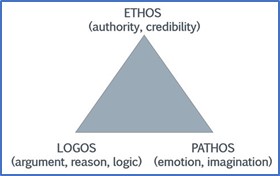To be vaccinated or not? To wear a mask or not? To vote for this leader or that one? To buy this product or that one? We are constantly on the receiving end of attempts to persuade us to believe something or to do something. Indeed, much of our ordinary everyday spoken or written communication involves attempts to persuade one another … and this blog is no exception!
Three Modes of Persuasion

More than 2,300 years ago, Aristotle gave us what are known as the three modes of persuasion – ethos, logos and pathos.
Ethos is about the extent to which the speaker or writer can be trusted. It is about whether we believe the speaker or writer knows what they are talking or writing about.
It is also importantly about their moral character. Do we perceive them to be honest, humble and genuinely caring for those with whom they are communicating? If not, we are less likely to be persuaded by what they say or write.
This is why celebrity endorsements are sought by advertisers. Endorsement by widely respected people like Martin Lewis of MoneySavingExpert.com, Carol Vorderman formerly of Countdown or journalist Michael Buerk make people more likely to be persuaded to buy the advertised product. It is a matter of the credibility of the communicator. In fact, Martin Lewis is so trusted by people in the UK that fake adverts have appeared claiming his endorsement even though he himself states publicly that he never endorses products!
Whereas the focus of ethos is on the communicator, the focus of logos is on what is being communicated.
Logos appeals to reason and evidence. It is a matter of how well a speaker or writer presents their case and argues their point or sets out their evidence.
This calls for discernment on the part of the hearer or reader. As a child, I would sometimes quote something to my father that I’d read in the newspaper and he would sagely respond, “Paper does not refuse ink”. He would surely have approved of the use of online fact-checking resources! They are important at the present time when conspiracy theorists so often take statements out of context and misinterpret statistics.
A very recent example of the misinterpretation of statistics is found in claims that the data from Israel on COVID-19 infections indicate a complete failure of their extensive vaccination programme.
Pathos focuses neither on the communicator nor on what is communicated but rather on the audience or readership. It is about the emotional appeal of what is being said or written, its impact on feelings and sympathetic imagination.
It is particularly effective when what is being communicated supports, agrees with and even strengthens the beliefs, values and hopes of the listeners or readers. This means that we need to be aware of the possibility of confirmation bias (our tendency to cherry-pick information that confirms our existing beliefs). I once expressed surprise to a friend at his choice of newspaper and he responded, “I don’t want to only read only what I agree with”!
We need all three modes
To focus excessively or exclusively on ethos is to appeal mainly or solely to authority. It is a matter not of the content of what is being communicated or its impact on the hearers or readers but simply one of “because she or he says so” or, worse still, “because I say so”. In other words, it is to be authoritarian. The authoritarian speaker or writer demands rather than earns trust. An example in these days of pandemic is the new Gnosticism of those who claim to have special knowledge about a new world order.
Main or exclusive focus on ethos leads to a guru mentality, an all-or-nothing approach to sources of information and guidance. This approach leads to people thinking that everything a ‘sound’ preacher says is to be believed and nothing said by an ‘unsound’ one can be trusted. It also underlies the belief that some newspapers or television news services always speak truth whereas others spread lies.
To focus mainly or exclusively on pathos, on emotion and imagination is to be manipulative. It is common in communications like political speeches and in advertisements on TV or in newspapers and magazines. It is easy to appeal to pathos when speaking to a group or writing for a readership who share a perspective on life.
Over the years, I’ve done quite a lot of speaking in church contexts and Christian conferences where I would share the general perspective of most if not all of the listeners. This can be an echo chamber situation and it becomes all too easy to communicate only that which one’s listeners would find acceptable and not to challenge them and address controversial issues.
Both of these misuses of persuasion (exclusive focus on ethos or on pathos) show the importance of reason, argument and evidence, the importance of logos. It is not simply a matter of who is speaking or writing or of the impact on hearers or readers. What is being said or written is of central importance.
On the other hand, to exclude ethos and pathos is wrong because it reduces all communication to reason. The rationalist view reduces the person to a brain-on-legs so that the body is merely the transport system for the mind.

However, we are whole persons and it as whole persons that we need to be persuaded. We communicate with one another as whole persons and even tone of voice and body language play their part.
It is a matter not solely of the mind but of the heart, of that which Tim Keller describes as “the seat of our most basic orientation, our deepest commitments” that “controls everything – our thinking, feeling, and decisions and actions”.
Ideally there is an appropriate balance of all three of these modes in any communication situation. Communicating with a very small child who is about to do something dangerous will appeal strongly to authority. Argument and appeal to reason and logic will be to the fore in academic writing but that doesn’t mean that ethos and pathos do not also have their place.
A quick visit to Mars Hill

I’d like to finish with a quick visit to Athens and an event recorded in the New Testament that took place nearly 400 years after the death of Aristotle. Paul met with the philosophers on Mars Hill and both what he said to them (of which we probably only have the main points) and how he said it gives evidence of all three modes of persuasion.
He showed that he was familiar with their philosophical approaches and their poetry and thereby invited them to trust him as being rather more than the ‘babbler’ some of them had called him. He developed a logical argument that started from shared premises but he was not afraid to say that God does not live in temples (like the one in the Acropolis towering above them) and go on to talk about Jesus as being risen from the dead. He was coming into their world and meeting them where they were and then appealing to them as whole persons to change not just their thinking but their whole ways of living.
However, use of all three modes does not guarantee success in persuading everybody! Some sneered and some believed. As Jesus said, the seed falls on different kinds of ground. Let’s pray that we may always play our part as wise persuaders and that we may discern what is true and good in the efforts of others to persuade us to believe something or do something.
P.S. If you would like to be notified when new blogs are posted, please EITHER (1) email me through the contact address on this website OR (2) message me if you have come here via a link posted on Facebook.
